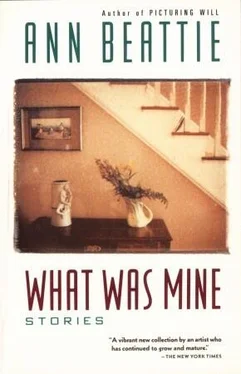Ann Beattie - What Was Mine
Здесь есть возможность читать онлайн «Ann Beattie - What Was Mine» весь текст электронной книги совершенно бесплатно (целиком полную версию без сокращений). В некоторых случаях можно слушать аудио, скачать через торрент в формате fb2 и присутствует краткое содержание. Год выпуска: 1992, Издательство: Vintage, Жанр: Современная проза, на английском языке. Описание произведения, (предисловие) а так же отзывы посетителей доступны на портале библиотеки ЛибКат.
- Название:What Was Mine
- Автор:
- Издательство:Vintage
- Жанр:
- Год:1992
- ISBN:нет данных
- Рейтинг книги:5 / 5. Голосов: 1
-
Избранное:Добавить в избранное
- Отзывы:
-
Ваша оценка:
- 100
- 1
- 2
- 3
- 4
- 5
What Was Mine: краткое содержание, описание и аннотация
Предлагаем к чтению аннотацию, описание, краткое содержание или предисловие (зависит от того, что написал сам автор книги «What Was Mine»). Если вы не нашли необходимую информацию о книге — напишите в комментариях, мы постараемся отыскать её.
What Was Mine — читать онлайн бесплатно полную книгу (весь текст) целиком
Ниже представлен текст книги, разбитый по страницам. Система сохранения места последней прочитанной страницы, позволяет с удобством читать онлайн бесплатно книгу «What Was Mine», без необходимости каждый раз заново искать на чём Вы остановились. Поставьте закладку, и сможете в любой момент перейти на страницу, на которой закончили чтение.
Интервал:
Закладка:
Two hours later — after stopping for a brandy on the way home, after showering together and fooling around in the tub, and after rushing, half-wet, into bed and making love — he gets up when he hears her breathing lightly and regularly and goes into the bathroom, carrying the alarm clock with him. He sets it in the light of the bathroom, wincing as the little hand stops at seven o’clock. Then he pushes the button up and puts it on the bathroom counter while he splashes his face with water. He opens the medicine cabinet and takes two aspirin from the bottle, swallowing them with water cupped in his hands. He runs his wet hands over his temples, letting the rest of the cool water trickle down his face. Then he looks at his face appraisingly in the mirror. He might be able to outskate her, through the sheer power of his legs, but she is able to outdrink him. She is on her side, asleep in the dark room, and she will no doubt be fine when she awakes in the morning, too.
As he gets back in bed, sliding the alarm gently onto the night table and feeling the button again to make sure it’s set, he realizes that the damp covers are going to make it difficult to relax and go to sleep. He intuits, somehow, that if something bad has not already happened — and he supposes it has not — something bad might still be on the horizon. He has seen enough movies, read enough books, to know what happens to restless sleepers, in damp beds, who have had too much to drink.
Something bad will happen. It is what he has been fearing for years, and what he continues to fear.
It does not happen until months later, when he has stopped thinking it is imminent. He has gone back to driving without his seatbelt, sometimes, when Julie is not in the car to impress. Mentally, he has checked off the possibilities that might have materialized: that Gennine would escalate her flirtations (she has not); that Nigel would be intelligent and handsome (he is, as Francine has said, boorish and pale, with a distracted gaze that would be funny if there were any energy behind it). Francine’s job is not too much work for her to accomplish; he does not resent doing errands any more than usual. Over the weekend, Francine and Julie collaborated on a crayon drawing of the three of them: a nuclear family, the daddy taller than the mommy, the child squarely in the middle, their primary orange skin tones particularly touching. The radon test came back negative; the sound of someone entering the house was only a shutter that had blown loose in the wind.
When the phone call comes early in the morning, things have been going along smoothly. He has recently been accomplishing things with ease.
The woman who calls, one of the mothers he has not met, tells him that Mrs. Angawa is dead. She was struck by a hit-and-run truck while crossing the street. She had gotten up early and gone to get breakfast things for Mr. Angawa. A paperboy gave a description of the truck. It was believed that Mrs. Angawa, struck from behind, died instantly.
He looks at the rumpled bed sheets. Francine also had risen at the crack of dawn, but she had been going to the hairdresser’s, to get a permanent. Her stylist had agreed to show up early, so Francine could get a jump on the day. Some things were worth tipping big for, she had told him the night before. He hated it when she made statements like that — statements that had nothing to do with what sort of person she was. Sometimes, he is sure, she pretends to be jaded to see what reaction she can elicit. At the ice-skating rink, though he had been almost flooded with thoughts near the end, one thing had come to him clearly: Remember that you married an actress, he had thought. She had been trained as an actress.
Mrs. Angawa is dead. Immediately he reassures himself that although it is a tragedy, she was not an intimate friend. She was someone he had a rather odd conversation with months before — a protracted conversation about Julie and the way she spoke, although it is clear that since befriending Cassie Wallace, Julie has a new, private, autonomous identity that doesn’t depend on the way her parents see her, or even on the way Mrs. Angawa might have seen her.
There will be no school that day, of course, the woman says. The following day a psychologist will be in the classroom, and after a discussion period the children will be introduced to the substitute teacher. If he feels he will have trouble talking to Julie about the tragedy, the psychologist will be sitting by his phone for the next hour or so, advising parents. The woman clears her throat. “I’m sure this is a shock,” she says, “but can you give some indication that you’ve heard me?”
He has been thinking of Mrs. Angawa, in her professional, singsong way, saying something like: “Julie is a very good student. She is very good at spelling. She likes to write.” It was like a mantra, a positive recitation that could be chanted in worried parents’ faces, to calm them. She was struck from behind? It was dawn, just past dawn, was that what the woman said?
“Yes,” she says.
She was out getting groceries.
It seems clear that that is so often the way. That in some very inconspicuous moment, a person can be overwhelmed.
He thanks the woman for calling. “It can’t be easy to announce a tragedy,” he says, his voice still hoarse from sleep. The alarm clock ticks almost silently. In the other bedroom, Julie is sleeping. He will let her sleep until she wakes up. There is no reason to awaken her with bad news. There is no school. Let her sleep.
He thanks the woman again for letting him know. As he stretches across the bed to replace the phone in its cradle, his hand snags a pair of pink panties under Francine’s pillow — one of the pairs he gave her the night they went ice-skating, which she had worn to bed the night before, lifting her nightgown over her head and wiggling provocatively before climbing into bed. He looks at them as if they were the strangest thing in the world. So little material, for so much money — that’s one way to look at it. They seem more bleak than silly, considered in context with the goings-on of the real world.
His mother used to say: Always wear clean underwear, in case you end up in the emergency room. For a split second, he tries to imagine what sort of panties Mrs. Angawa might have been wearing when she was struck.
He thinks: I am focusing on details because I don’t want to think about the larger picture.
He gets out of bed.
He makes the bed, which he does not usually do. He smooths the duvet. Touching it, he suddenly thinks of the rabbit.
He sits on the newly made bed, his hand over his mouth. What a thought just came into his head: the rabbit will be in the dark closet all day if someone doesn’t think to take the cage out.
But the whole school isn’t closed, he reminds himself. One of the other teachers …
There is no harm in calling. When people are upset, they might not focus on what needs to be done.
He thinks about calling Francine at the hairdresser’s.
He goes downstairs, pulling on his robe, tiptoeing and skipping the third stair, which creaks. He walks to the kitchen, gets the telephone book, and looks up the name of the shop. He dials the number. It rings four times. On the fourth ring, a recorded message comes on, giving the shop’s hours of operation. It will not be open for two more hours. He hangs up.
Sun is streaming into the kitchen. He goes to the stove, shakes the kettle, feels that there is enough water, turns on the burner, and leans against the counter. The room goes slightly out of focus. What would I do if it happened to Francine or Julie? he thinks, as the room shimmers.
He thinks of how precious every scrap of paper Julie ever colored on would become. How precious every doll would become. And Francine: what it would be like to run his fingers along the padded shoulders of the silk blouses, all in a row. How he would feel taking the top off her tube of lipstick, how it would break his heart to pick up her bottle of perfume from the bathroom counter.
Читать дальшеИнтервал:
Закладка:
Похожие книги на «What Was Mine»
Представляем Вашему вниманию похожие книги на «What Was Mine» списком для выбора. Мы отобрали схожую по названию и смыслу литературу в надежде предоставить читателям больше вариантов отыскать новые, интересные, ещё непрочитанные произведения.
Обсуждение, отзывы о книге «What Was Mine» и просто собственные мнения читателей. Оставьте ваши комментарии, напишите, что Вы думаете о произведении, его смысле или главных героях. Укажите что конкретно понравилось, а что нет, и почему Вы так считаете.












